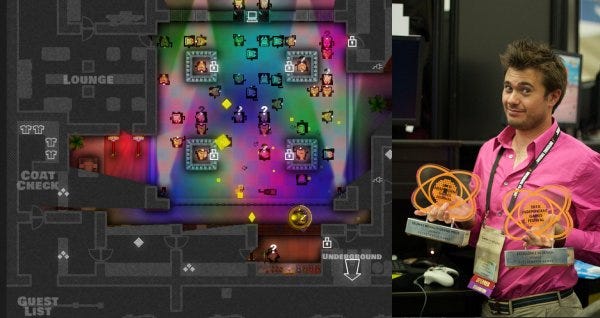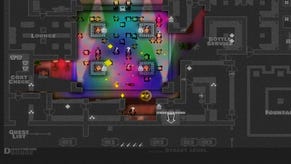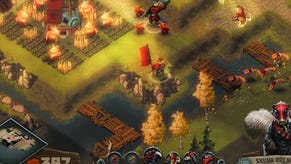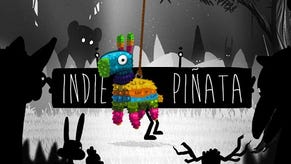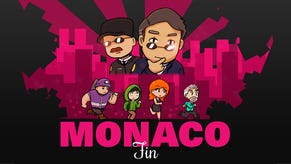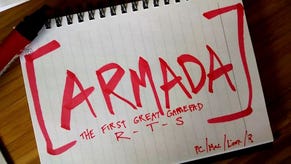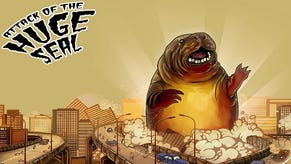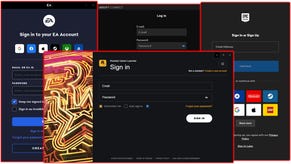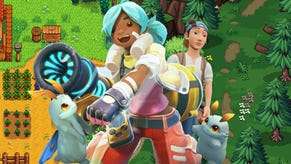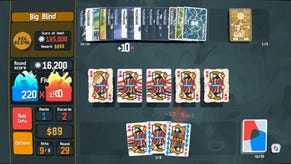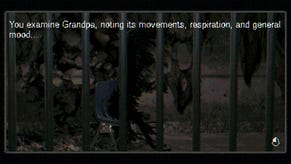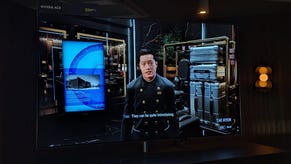It's A Steal: Andy Schatz Talks Monaco, Other Stuff
In The Bag
Andy Schatz' inspired multiplayer co-op heist game,Monaco, is a lot of fun. I'll describe that fun to you in more detail in another article. For now, though, with the game just a couple of months from release, have a read of my chat with the creator of the IGF-winning game. We talk Indie Fund, Kickstarter, Volcanoes, and the joy of beta testing. Read on!
Schatz: Wow, your mic is terrible!
RPS: I know, I don't have my usual setup because of moving house, no idea where my good mic is. I've subjected Jon Mavor and Ken Levine to this buzzing noise in the past couple of weeks though, so you aren't alone.
Schatz: I'm in a good company, I guess...
RPS: Has it really been two years since we talked about Monaco?
Schatz: Yeah. Would have been at that table at GDC. I've been working on this game for a tenth of my life.
RPS: Yikes.
Schatz: I've worked on this game for... all of elementary school.
RPS: That seems like a lot of life to commit to a project.
Schatz: I'm really proud of the game, really really happy with it. I don't look back with any sort of regret. And let's face it, this isn't like it's Duke Nukem, this is still within a reasonable time frame for making a game. You always look back and say to yourself “if knew what I know now I could have done things a lot faster”, I could be working on another game, or I could be making this game bigger, but... Anyway that's interesting because we've gotten so used to the idea of yearly releases in games. When you are trying to do things that are really new, well, you can't make games that are big and fully featured, and do a lot of new things in a short time. And sometimes we get those yearly released games doing something big, and then that's because there are two huge teams working on two year schedules that are staggered within that. I have a hard time believing innovation happens inside a year!
RPS: Also, the process of doing what you want to do (in game design) changes what you want to do, doesn't it?
Schatz: I made some comments about Kickstarter that kicked up a bit of fuss on the internet last week. The comment was about Kickstarter stretch goals, and how they can have a negative effect on design. I don't at all hate Kickstarter, I think it is fantastic, but I think the ways stretch goals are set are not good in terms of design. If you are adding on optional features, you are going to have a game that is bloated, or incomplete. By locking in the features you are going to have in the game at the beginning of the game, especially optional features, those are the only ones you are committing to! Even a few months in you might find that the stretch goal-funded game mode you promised doesn't work very well. If I imagine a Kickstarter for Monaco, and imagine what it was like when I started, then it has an entirely different cast of characters, that cast evolved, it had three game modes, including a cops and robbers, but that just wasn't up to to the quality of the rest of the game... We prototyped it all pretty heavily, actually, but if I had promised all that in stretch goals, well, I would be in a bind.
RPS: Why throw that away? Aren't you tempted to just to put that out anyway, even if it's a bit lower quality?
Schatz: Well, I generally like to release everything I ever work on, and I would like to release those game modes in a state where I am happy with them. Those game modes work, but not within the existing content. We were going to have rebuild levels for them, so within the framework of a Kickstarter I would have needed more funding. That would have put me in a bind, theoretically. I would like to support them in the future, when we can make that content.
RPS: You've done all this work, and yet won the IGF years ago with this game...
Schatz: Yes. It was in 2010. I won the IGF with a prototype I'd been developing for 15 weeks. The prototype is available to people who pre-order. If you pre-order Monaco, you get a copy of the game that won the IGF.
Schatz: I've renamed it “Monte Carlo” so we know which version people are referring to. The core of the game is very much the same – and one of the levels has much of the same architecture in. It's a dramatically better game now, of course. But yeah it was a game that was innovative and artistic and interesting, and it did something that was about stealth and heists, which there wasn't much of at the time, but now of course there's quite a bit of it... yeah it's already a thing [laughs] The next time someone says Monaco is Hotline Miami with lockpicks, I'm going to punch them in the face, because I've never seen anyone say that Hotline Miami is Monaco with murders! [laughs]
RPS: Yeah, I had this discussion with my Big Robot team recently, where we noticed that if we have an idea for a game, there is another game of it by someone else like six months later. So we decided the best thing was to not have any ideas ever again.
Schatz: Yeah. I was really lucky to have stumbled on to the idea of Monaco. I am not some amazing artist who has come up with something innovative from a thematic perspective – this stuff has been around for a long time. I just happened to get lucky that no one had made a great game out of it yet. One of the interesting things of the last three years, everything was about retro indie-console nostalgia three years ago, and now it's retro-PC nostalgia. That dungeon game... erm... oh...
RPS: Grimrock?
Schatz: Grimrock! And even the XCOM remake, that is more PC nostalgic stuff. That dominates now.
RPS: You can almost see the shockwave ripple coming out from the indie centred around the IGF, where a lot of the people who wanted to do console type stuff were first to realise they could just go and do that and potentially be super-successful, and then later it hit the PC guys, perhaps some of them older guys who were working at dev studios, especially dev studios who were evidence of “decline of PC” stuff from a few years ago.
Schatz: It's going to be interesting to see these old timers coming back and working on their dream games.
RPS: I talked to Jon Mavor, whose Planetary Annihilation Kickstarter went huge, like $3m huge, and he said something really interesting, he said: “there's a lot of unfinished business in the RTS genre” and after I read that it my write up I thought “well, that's actually true of almost every genre!” There's unfinished business everywhere, because we can always see the paths down which games can and should evolve. The response to every game ever is generally “but wouldn't it be cool if...” and then nobody made that game.
Schatz: I would LOVE to make an RTS game that didn't focus at all on APM. I mean I really like Starcraft, but I stopped playing it because it's exhausting. I want to play games I can relax a little more at. Also I sit at my desk all day, like sixteen hours, so now I play console games even though I am really a PC gamer at heart. I want to sit with a gamepad on my couch and play RTS games, and no one has really come up with a redesign that totally works. I mean let's redesign from the ground fucking up! Redesign to work on a gamepad and I would play the shit out of that game.
RPS: That must be possible, though... a few attempts failing just means no one bothers trying.
Schatz: Well the attempts that have been made generally just approach it by redesigning the interface of existing RPS games, and I think you actually have to redesign the game entirely in order to work with a console control. Pikmin is close maybe.
RPS: I enjoyed From Dust, I know that was not generally well received.
Schatz: I loved From Dust! That's an interesting one. It's a flawed experiment, I think, but I've not felt quite so epic in other games.
RPS: I met Eric Chahi when that came out, and I don't think I had met him before, but he seemed to think he knew me, and produced an iPad and said “here, watch my documentary about Volcanoes!” and so I watched him all over the world peering into the flaming lid of these terrifying burning holes somewhere in Indonesia.
Schatz: Wow! I guess he had an ongoing passion for it?
RPS: Yeah, I think that film was long in the making. He had various haircuts in the footage.
Schatz: I've been indie for eight years now, and the first games I made were the ecosystem ones, I really have a strong interest in that. Part of the reason I wanted to work on those games, and why I wanted to build a franchise out of it was that I really wanted an excuse to travel to those places. But that's like a rockband saying they only started the band to get girls, to say I only became an indie game dev to travel. Ha, that's pretty lame!
RPS: And how much did you travel?
Schatz: Well, not as much as I'd hoped, but after the IGF I went to China to speak in Shanghai, and my wife came with me and we went to Thailand... not for research purposes, but yeah. It was an adventure.

RPS: I suppose indie dev, like writer, is simply another career where you spend a lot of time sat alone in a room. I mean, if you can't spend a lot of time sat alone in a room, don't do these things.
Schatz: Or you could be like the Northways, right? I don't know how they get anything done. I look at them with such envy. There are other people who have done similar stuff, but there's no way that you can really get away from the hours in front of a computer. Incredipede is really great, but I can't get away from that. So many hours. When I look at the past three years, and then forward at the next sixty or so... do I want that again? Or do I want to work less each day and take five years? No way. I have to hope Monaco does well and I can hire some help.
RPS: You have had some help though, by way of the Indie Fund. How has that been?
Schatz: Well, I am very lucky because I know most of those guys personally, and I was able to hook up with them directly after the IGF win, when I decided that we wanted to expand the project. It's been really great. I took $100,000 from them and that partially supported myself, partially to support contractors, and partially to support the business – I had to go to PAX and the like. My wife was still working, and I had a little money from previous games, and I also got some help from my parents too. So yeah. Anyhoo, working with Indie Fund is great – they're really flexible. Some of the people who worked with Indie Fund said that what was amazing was that it comes with these really great advisors, although personally I hate people telling me what to do! In all seriousness though they have provided me with some useful guidance, as well as money. But I do like to fly solo, and they try and fit the needs of the developer.
Their primary goal, though, is to try and promote healthier development dynamics, and their attempt is to break the dependent relationship with publishers and...well, I don't know if they have been involved in enough games to say what their effect has been, but the good news is that the industry is moving in the direction they are trying to promote, with crowd-funding and other things. I hate to say this, but the demise of variety of publishers does seem to be proving that the way of life of developers from ten years ago cannot stand.
RPS: Surely it's becoming self-perpetuating at this stage. I talk to loads of new small studios now and they're all “oh yeah I worked at Sony, oh yeah I worked at Lionhead” and they are all looking across at indies and the allure of working for a big studio on some mega-funded AAA thing drops away. They just want to make beautiful games.
Schatz: That's what happened to me! Eight years ago I quit my job after doing a job for a contract company that mostly worked for EA. I did all the Xbox Live front end stuff for Whacked, which I was really proud of, that was an achievement. I didn't sell well or review well, but whatever. Journalists are idiots! [laughs] Then I worked on a Medal Of Honor expansion, and that really bad GoldenEye reboot. And then EA told us we all had to go live in LA for a few months to work, and one guy who was married had to fight to see his kids during four months of crunch. I was working all-nighters on a shit game for no credit. At that point I was like “this is broken, I am no longer interested in being a part of this”. I think it has changed though, the industry is better at that stuff than it was then. But I said “screw it!”
RPS: I wonder about the brain-drain at the big studios, too.
Schatz: Well I think the big BIG studios have a lot of talent still, it tends to be the medium sized ones who lose out to indies. And hey indie development is not for everyone. I don't think it's a worry, because these people aren't leaving the industry. Personally I feel like I wasn't contributing anything that couldn't have been contributed by someone else on those projects.
RPS: Anyway, Monaco multiplayer. That sounds like it was a serious challenge for you?
Schatz: It's really fun. I've been working with enthusiastic beta testers, and that's easily one of the highlights of my career. I don't know if you will post this entire interview, but hey you guys rock! We've got people who've put in like 200 hours, which is awesome and scary. It's really been a blast. The part that has really burned me out the most was working on cleaning up the Xbox, though. I am working with Majesco, and they've been great, but working on a closed is a lot less fun than working on an open system. If I need additional enthusiasm for that I can give out a beta key on twitter, but obviously I can't do that with the Xbox. Online stuff is difficult, and not always creative, but working with enthusiastic people is amazing and I would do it again in a heartbeat.
RPS: What's next for Monaco?
Schatz: In eleven days the Xbox game is submitted to certification. There are still some issues for the PC like mouse control in menus. But in eleven days the game is essentially done. And then hopefully I don't have too many issues I have to fix. I will clean the editor up – that should be a beta day one DLC, maybe a week later, PC only of course. Basically we're just cranking away on the eventual launch. I'm not allowed to set a release date on Xbox, and I hope Microsoft change their practices in this regard, but certification takes four to six weeks, so at the end of that we will be able to set a release date. We won't have the game out in March, so more like April.
RPS: Have you thought about what you are going to work on next?
Schatz: Yeah. Hell yeah. I have to yank on my own collar to stop myself starting work on what I want to do next. I only have a limited number of hours I can sit in my desk chair before my body begins to ache and moan. I can't work on the next thing until I am done done done and done. I have a bunch of ideas, actually, but one I am in love with. The next thing needs to be a six week project, too. That is how I approached Monaco. If it works, then I could spend more time on it. If not, then I leave it.
RPS: Good luck. Thanks for your time!
